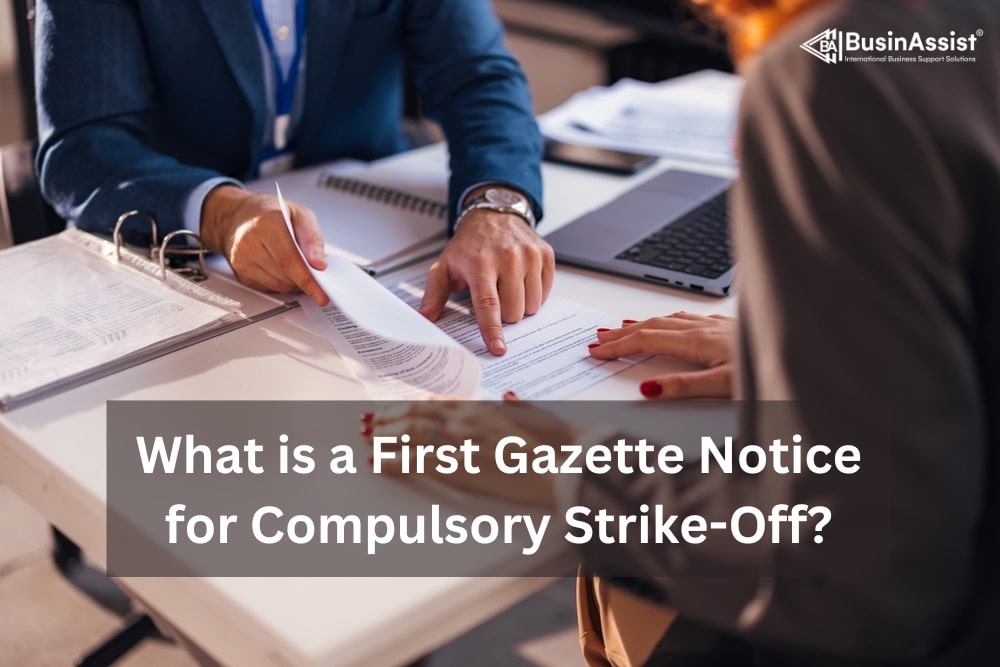Just how to Reply to the First Gazette Notice for Compulsory Strike Off
Just how to Reply to the First Gazette Notice for Compulsory Strike Off
Blog Article
Understanding the Refine and Effects of Compulsory Strike Off Under Company Regulation
In the realm of company legislation, the procedure and implications of obligatory strike off hold substantial weight for businesses and their directors. Comprehending the details of why companies face such a result, the thorough actions associated with the strike off process, and the far-reaching ramifications for all events involved is essential in navigating the complicated landscape of business administration. As we look into the reasons behind mandatory strike offs, the taking place treatments, and the succeeding repercussions, a clearer picture emerges of the extensive effect it can carry individuals and entities alike.
Reasons for Compulsory Strike Off
Compulsory strike off under company law is initiated by the regulatory authorities for particular reasons associated to non-compliance or functional irregularities. The main reason for a business to deal with mandatory strike off is the failure to file annual returns or monetary statements for a prolonged period. This non-compliance indicates a lack of transparency and adherence to regulatory requirements, increasing worries regarding the firm's financial health and accountability.

Process of Strike Off
Given the regulatory authority's initiation of compulsory strike off for numerous factors, recognizing the process of strike off is important for companies facing potential dissolution under company law. The procedure normally starts with the regulative authority sending notifications to the firm's authorized office address, informing them of the impending strike off. It is crucial for the firm to attend to any outstanding concerns, such as filing overdue records or clearing up exceptional fees, within the defined duration to prevent dissolution.

Ramifications for Companies
What are the implications for companies encountering mandatory strike off under firm legislation? Firms dealing with compulsory strike off may encounter a number of substantial ramifications. The firm ceases to legitimately exist, resulting in the loss of its corporate status and the coming with securities and advantages. This can cause the inability to become part of agreements, conduct service, or seek lawsuits in the business's name.
Moreover, the company's possessions at the time of strike off end up being residential or commercial property of the state, which can cause monetary losses for financial institutions and investors. Investors might shed their financial investments, while creditors might struggle to recover any outstanding debts owed to them by the struck-off company.
Furthermore, directors of the firm might deal with disqualification from holding similar placements in various other business for a specified duration (first gazette notice for compulsory strike off). This can stain their expert credibility and restrict their future service chances
Consequences for Supervisors
Dealing with compulsory strike off under firm legislation can have severe implications for directors, influencing their future functions in other firms and potentially staining their expert standing. Supervisors of a business facing obligatory strike off may locate it challenging to safeguard directorial settings in various other business in the future. This is due to the fact that the strike off suggests a failing to adhere to lawful commitments, increasing problems regarding the supervisor's ability to accomplish their responsibilities properly. Moreover, the stained expert online reputation resulting from a required strike off can result in a loss of trust fund from business clients, stakeholders, and partners. Supervisors might additionally face personal financial obligations if they are discovered to have actually acted negligently or fraudulently, leading to potential legal actions against them. Generally, the effects of required strike off for supervisors extend beyond the specific company concerned, affecting their occupation leads and specialist credibility in the long term.
Staying Clear Of Compulsory Strike Off

Final Thought
To conclude, recognizing the procedure and effects of compulsory strike off under company law is vital for supervisors and business to make sure conformity with laws. By being aware of the factors for strike off, the procedure entailed, and the effects for all events entailed, firms can take actions to stay clear of undergoing obligatory strike off. It is very important for supervisors to be Related Site positive in preserving appropriate records and meeting statutory obligations to stop the threat of strike off.
Offered the governing authority's initiation of obligatory strike off for different reasons, understanding the process of strike off is essential for companies facing possible dissolution under firm legislation.What are the ramifications for firms encountering obligatory strike off under business law?Dealing with compulsory strike off under firm legislation can have severe implications for directors, impacting their future duties in other firms and possibly tarnishing their specialist standing. Supervisors of a company encountering obligatory strike off may locate it challenging to secure directorial placements in other firms in the future.In final thought, understanding the procedure and ramifications of mandatory strike off under firm legislation is essential for firms and directors to make certain compliance with regulations.
Report this page